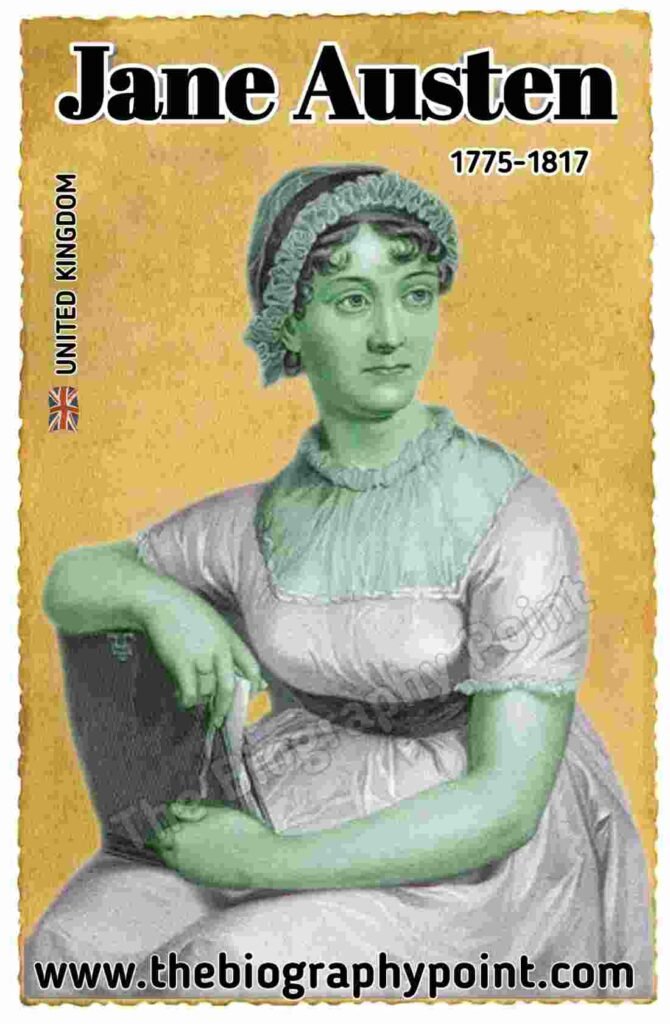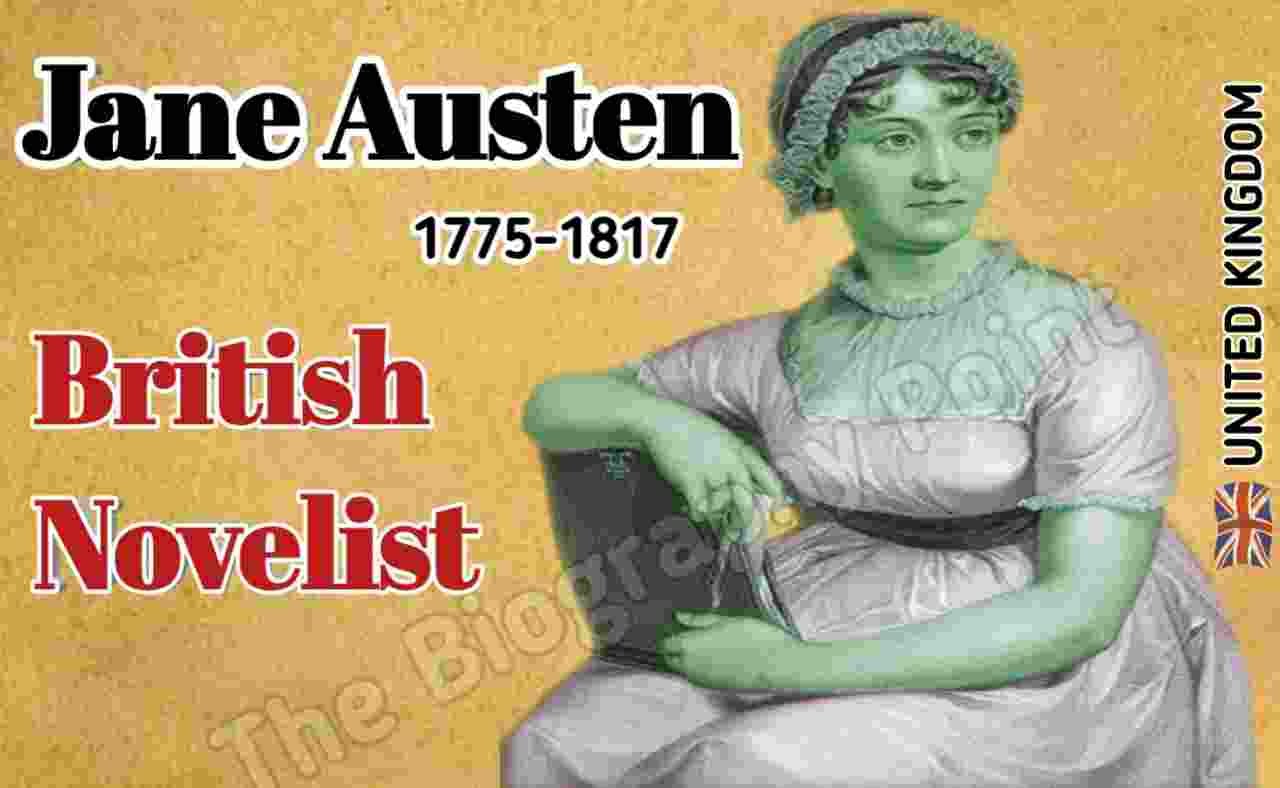Personal Details
| Name | Jane Austen |
|---|---|
| Born | December 16, 1775, Steventon, Hampshire, England(United Kingdom) |
| Name Of Father | George Austen |
| Name Of Mother | Cassandra Austen |
| Spouse | Never Married |
| Siblings | Henry Thomas Austen, James Austen, Edward Austen, Francis Austen, Charles Austen |
| Nationality | England (United Kingdom) |
| Died | July 18, 1817, Winchester, (United Kingdom) |
Jane Austen Biography

Introduction
Jane Austen is a famous writer known for writing about how people acted and treated each other in the late 1700s and early 1800s. Jane Austen was born on December 16, 1775, in Steventon, Hampshire, England. Her books have made a big impact on literature. This book explores her life, looking at how she was shaped by her experiences, what she added to literature, and how her novels continue to affect people.
Early Life and Education
Jane Austen was the seventh of eight children born to George Austen, a minister, and Cassandra Leigh Austen. Developing up in a close-knit family, she gotten her instruction essentially at domestic, benefitting from her father’s broad library. Her instruction included presentation to writing, reasoning, and the expressions, which laid the establishment for her afterward scholarly interests.
The Austen family was well off, which meant Jane could focus on what interested her without worrying about money. Even though women didn’t have many opportunities for education back then, Jane’s family helped her learn and encouraged her to love reading and writing.
Literary Beginnings
Jane Austen started writing at a young age. Her writing when she was a teenager was funny and sarcastic, and it showed that she was becoming a talented writer. “Catharine” and “Love and Freindship” are some of her early writings that give a peek into her early attempts at writing. She was good at making fun of popular books and creating interesting characters, which showed that her future books would be great.
Austen’s first grown-up book, “Sense and Sensibility,” was published without her name in 1811. This book, like a lot of her other books, looked at the rules society had at that time. It focused on the problems women faced in a society that cared a lot about social status and getting married.
Literary Style and Themes
Jane Austen wrote books with her unique way of telling a story, her cleverness, and her sharp understanding of society. Her stories are usually seen as funny portrayals of how people behave in specific social situations, especially when it comes to dating and getting married. Her books like “Pride and Prejudice,” “Emma,” and “Mansfield Park” are still popular because they have interesting characters, smart conversations, and show how society works.
Austen talks about how women were limited and expected to get married in her books. Her main female characters, like Elizabeth Bennet and Emma Woodhouse, face difficulties in their social worlds but stay true to themselves and look for real friendships.
Also Read
Personal Life and Relationships
Although Jane Austen wrote about romance, her own life was not as filled with romantic adventures as her novels. Many people have been discussing and debating who she might be dating and who her potential partners are. Austen chose not to get married and lived a quiet life in the countryside of England. This has made people curious about her personal life.
Her sister Cassandra and her family were always there for her and gave her a lot of emotional support. The letters Jane and Cassandra wrote to each other show what their lives were like and give us a better understanding of Jane Austen’s personality and how she saw the world.
Publishing Challenges
In the early 19th century, most writers were men. Jane Austen had a hard time getting her books published, so she first published them without her name on them. The title page of “Sense and Sensibility” only said the book was written by a lady. Even though it was hard for women writers at that time, Jane Austen’s books became popular and her writing style started to stand out in the literary world.
Later Works and Recognition
Austen kept writing great books, like “Pride and Prejudice” in 1813 and “Emma” in 1815. Austen’s books became popular with a specific group of readers, but most people didn’t know who she was. Her brother, Henry Austen, didn’t tell anyone that she was the author until after she died in 1817.
After Jane Austen died, her books became popular again. People who read and people who judge books started to see that her comments about society are still important today, and that her characters are still interesting to people. Her books were printed again, and plays and movies were made from her stories so more people could enjoy them.
Legacy and Adaptations
Jane Austen’s influence on literature and popular culture has lasted for more than 200 years. Her books are still read by many people and are used for study and turned into different types of media. Many movies and TV shows based on Jane Austen’s books, like “Pride and Prejudice” and “Clueless,” show that people still love her stories today.
Outside of just being entertaining, Austen’s writing has also had an impact in academic discussions. Experts have been studying the ideas of social class, gender, and what is right or wrong in her books. Her books show us what life was like in the Regency era and can teach us about human the way people act and feel, no matter when or where they lived.
Conclusion
Jane Austen’s life and writing are very important to English literature. Her sharp observations, cleverness, and skill at showing the little details of how people act have made her one of the best writers in English. As we learn more about Jane Austen’s books and their impact on culture, it becomes clear that her work will continue to be important for a long time. She is considered a very important writer who will be remembered for many years.
Certainly! Here are frequently asked questions (FAQs) about Jane Austen’s biography:
Q. When and where was Jane Austen born?
Jane Austen was born on December 16, 1775, in Steventon, Hampshire, England.
Q. What were the names of Jane Austen’s parents?
Her father was George Austen, and her mother was Cassandra Leigh Austen.
Q. How many siblings did Jane Austen have?
Jane Austen had six siblings: James, George, Edward, Henry, Cassandra, and Francis.
Q. Did Jane Austen ever marry?
No, Jane Austen never married. She remained single throughout her life.
Q. What education did Jane Austen receive?
Jane Austen was largely educated at home, where she had access to her father’s extensive library. She also attended a boarding school for a short period.
Q. Which novels did Jane Austen write?
Jane Austen is known for her six major novels: “Sense and Sensibility,” “Pride and Prejudice,” “Mansfield Park,” “Emma,” “Northanger Abbey,” and “Persuasion.”
Q. What is Jane Austen’s writing style known for?
Jane Austen’s writing style is characterized by wit, irony, and keen observation of social manners and relationships.
Q. What inspired Jane Austen to become a writer?
– Austen began writing as a young girl, and her love of literature and storytelling likely stemmed from her father’s library and the literary culture of her time.
Q. Why did Jane Austen’s novels initially get published anonymously?
During the 19th century, it was common for female authors to publish anonymously, and Austen’s works were no exception. Her novels were initially published “By a Lady.”
Q. What was Jane Austen’s relationship with her sister Cassandra like?
Jane Austen had a close and enduring relationship with her sister Cassandra. They corresponded extensively, and Cassandra was one of Jane’s closest confidantes.
Q. Did Jane Austen face challenges in getting her novels published?
Yes, Jane Austen faced challenges in getting her novels published. Her works were initially rejected by publishers, but she persevered, and her novels eventually found success.
Q. What is the significance of the term “Regency era” in relation to Jane Austen?
The Regency era (1811–1820) marked the period when George III was deemed unfit to rule, and his son, the future George IV, served as Prince Regent. Jane Austen’s novels are often set during this time and reflect the social and cultural norms of the Regency period.
Q. Did Jane Austen achieve success during her lifetime?
While Austen’s novels gained a modest readership during her lifetime, she did not achieve widespread fame. Her true recognition as a literary giant came posthumously.
Q. What are some of Jane Austen’s most famous quotes?
Examples include “It is a truth universally acknowledged, that a single man in possession of a good fortune, must be in want of a wife” from “Pride and Prejudice” and “Emma, I cannot make speeches. If I loved you less, I might be able to talk about it more” from “Emma.”
Q. Did Jane Austen have any close literary friendships?
Austen had a literary friendship with the novelist and poet Sir Walter Scott. They admired each other’s works, although their writing styles differed.
Q. What was Jane Austen’s impact on the literary world?
Jane Austen is considered one of the greatest novelists in English literature. Her works continue to be widely read, adapted, and studied for their social commentary and timeless themes.
Q. Did Jane Austen ever travel abroad?
No, Jane Austen did not travel extensively. Most of her life was spent in rural England, and she did not venture abroad.
Q. What is known about Jane Austen’s personal romantic experiences?
There is limited information about Jane Austen’s personal romantic experiences. Some speculate that she may have had romantic feelings for individuals in her life, but concrete evidence is scarce.
Q. How did Jane Austen’s family support her writing?
Jane Austen’s family was supportive of her writing endeavors. Her father encouraged her literary pursuits, and her brother Henry helped with the publication of her novels.
Q. Did Jane Austen use her own experiences in her novels?
While Austen drew inspiration from her surroundings, her novels are not direct autobiographical accounts. She used her observations of society and human behavior to create fictional narratives.
Q. What is the significance of Jane Austen’s novel “Northanger Abbey”?
“Northanger Abbey” is a satire of the Gothic novel and a commentary on the expectations and pitfalls of young women in the society of the time.
Q. What is the legacy of Jane Austen’s work?
Jane Austen’s legacy is enduring, and her novels continue to be celebrated for their exploration of human nature, wit, and social commentary.
Q. How did Jane Austen’s novels deal with issues of class and social hierarchy?
Austen’s novels often explore the social class distinctions of her time, highlighting the challenges and expectations faced by individuals in different social strata.
Q. What was Jane Austen’s health like?
There is speculation about Jane Austen’s health, and some suggest that she may have suffered from Addison’s disease or lymphoma. However, the exact nature of her illness remains a subject of debate.
Q. When did Jane Austen pass away?
Jane Austen passed away on July 18, 1817, at the age of 41, in Winchester, England.
Q. Where is Jane Austen buried?
Jane Austen is buried in Winchester Cathedral in Hampshire, England.
Q. How did Jane Austen’s reputation grow after her death?
Jane Austen’s reputation grew significantly in the decades following her death, with increasing recognition of her literary genius. The publication of her nephew’s biography in 1870 further contributed to her posthumous fame.
Q. Are there any film adaptations of Jane Austen’s novels?
Yes, there have been numerous film and television adaptations of Jane Austen’s novels, including iconic versions of “Pride and Prejudice,” “Sense and Sensibility,” and “Emma.”
Q. What is the Jane Austen Society, and when was it founded?
The Jane Austen Society is an organization dedicated to the appreciation and study of Jane Austen’s life and works. It was founded in 1940.
Q. How has Jane Austen’s work influenced modern literature and culture?
Jane Austen’s influence can be seen in countless novels, films, and other forms of media. Her exploration of social relationships and character development continues to inspire writers and entertain audiences worldwide.











